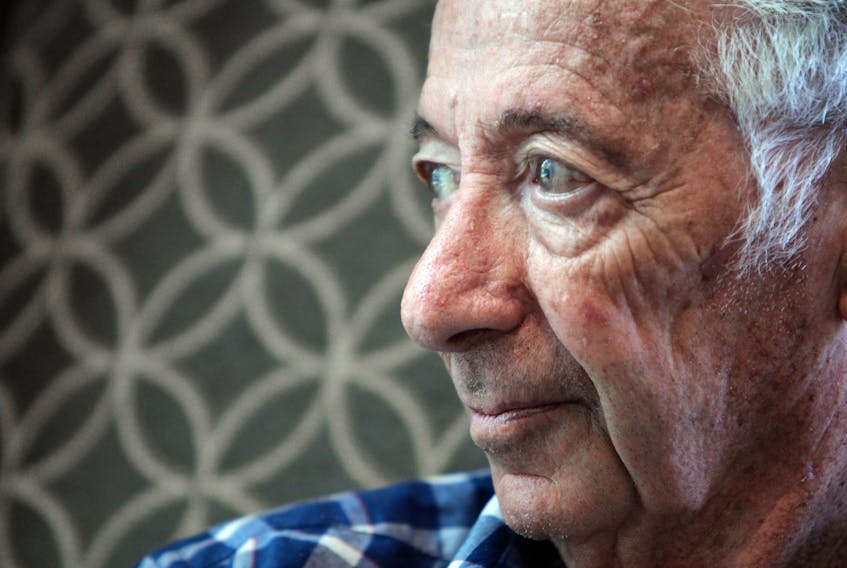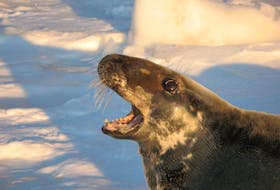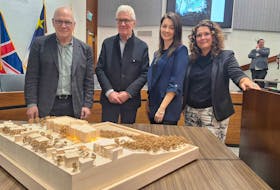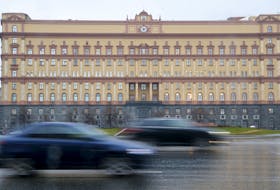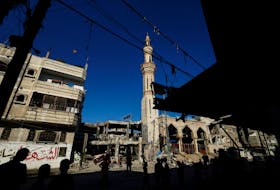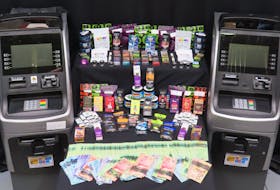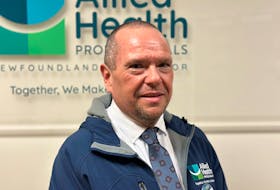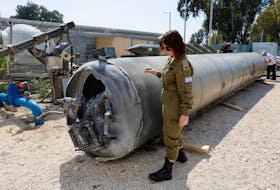This story was originally published Sept. 14, 2018, but we thought we would share it again for International Holocaust Remembrance Day.
By April 1943, Michael Falk and his parents had been enclosed in the Warsaw Ghetto for close to three years.
Michael was 12, had been denied formal schooling, was starving, but tried to live as though the (Second World) war would end at any time and life would be good again.
By April 19, after seeing Jewish family members, neighbours and friends herded onto trains to the Nazi death camps, Michael’s father pushed his wife Leonia and his only child to escape the ghetto while he remained to fight.

“It is unforgettable,” recalls the 87-year-old, sitting in his Halifax home with wife Lilian, also a survivor of the war. “We were fortunate that friends in the country were willing to hide us.” They were in hiding about 20 miles outside Warsaw, where they could see the burning of Jewish residences, businesses and lives.
A year later, they were discovered. With assistance from the Jewish Polish underground, they returned to Warsaw, hidden by non-Jews who accepted money to stash them, even though aware of their own endangerment.
In August 1944, as Polish underground forces battled the Germans in Warsaw, “we lived in cellars, with bombing and shelling going on above us,” Michael recalls. “We were so dependent on people to bring us food. We couldn’t go out and here were no shops anyway. We survived on little more than bread.”
The Warsaw uprising ended Oct. 1, 1944. The Russians arrived in January 1945. Michael and his mother were saved. His father had been captured in 1943 and taken to work camps but, being physically able, was not a candidate for extermination, unlike many of their close relatives.
“We discovered from him later that he was in Auschwitz and other camps, including one headed by (Oskar) Schindler, noted for saving Jews. When the war ended, he came home. It was a happy reunion.”

After the war, Michael, then 14, was sent to an orphanage, “the best thing for me,” he says. “I had instant recovery … teachers, psychologists as needed, among other children from age three to 17. We got over our wartime memories very quickly. We talked of our memories only once and then wouldn’t talk about it anymore. It was time to move on.”
However, it was soon found he had two living parents in nearby Warsaw and Michael was returned to them.
A year after the war, his father, Ignatz Falk, known as anti-communist (the Russian-backed communist regime had taken hold), was forced to leave Poland or end up in jail.
“He feigned an illness that could only be treated in Switzerland and received a visa for the family to go there,” says Michael. “From there to France, and then, with sponsorship from friends in Canada, we came to Montreal in September 1949. I was 17.”
Michael didn’t attend formal school until high school in Poland after the war, being barred from schools from 1940 to 1945 because he was Jewish.
In Montreal, mostly fluent in Yiddish, German and Polish, he quickly mastered English and attended McGill University, as a second-year science student. He earned an honours chemistry degree, then received a PhD in physical chemistry from Laval University in Quebec City, where he learned French.
By then, his parents divorced. His father lived to be 92 in Montreal. Leonia eventually moved to Halifax to be with Michael and his family, and lived to be 107, spending her final years at Northwood.
“We were so dependent on people to bring us food. We couldn’t go out and here were no shops anyway. We survived on little more than bread.”
In 1972, Michael came to Halifax as a senior research officer with the National Research Council’s biochemistry section. His job disappeared in 1995 and he retired at 64.
His wife Lilian, also a Warsaw native but living in Israel, met Michael in 1958 when the two were taking summer courses in London, England. Housed in the same co-ed residence, they talked of mutual friends and their common past.
Lilian says, “My father left Poland for Palestine before the war and wanted my mother, a doctor, to go with him, but her medical degree wasn’t acknowledged there.
“As a beloved doctor, her (non-Jewish) friends protected her,” says Lilian. “Finally, in 1944, she decided we’d go to Israel. We crossed the border, protected by the underground, and I recall being told not to go near windows, not to answer the door. I still can’t believe all that happened.”
Months after he met Lilian in London, Michael went to Israel, proposed, was accepted, and they married in 1959. They are now approaching 60 years together.
They have two sons – Jonathan, a University of Toronto graduate and high school teacher in southern California, and Dan, a Dalhousie and Ryerson grad, working in journalism.
Today, Michael says he lives optimistically, always looking forward. He doesn’t resent the Polish people for turning against the Jews under the German regime.
“I have great respect for the Polish people, yet deplore the fact there is still anti-Semitism among them and they haven’t learned. I’ll always remember Polish Christians saved our lives and others.”

